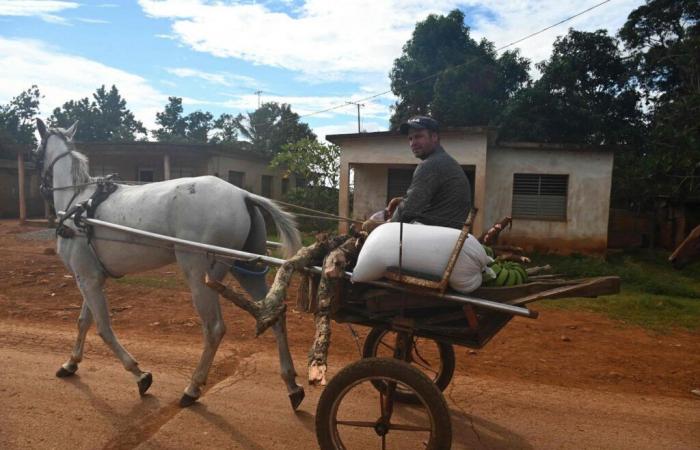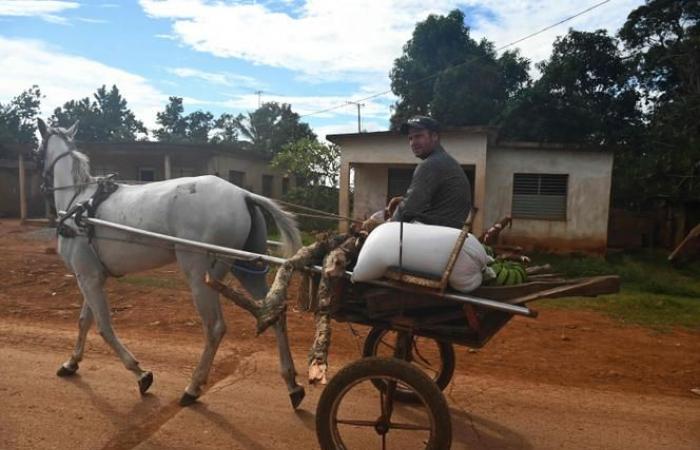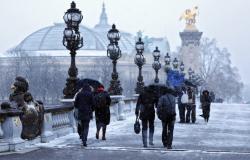Hurricane Rafael, category 3, caused the collapse of Cuba's electricity supply system, plunging its ten million inhabitants into darkness, said the national electricity company (UNE).
“Violent winds caused by the high intensity Hurricane Rafael caused the disconnection of the national electricity system”the company said on X. A giant power outage on October 18 left the island without electricity for four days.
In the evening, Hurricane Rafael was rated category 3 on the Saffir-Simpson scale (which has 5). “ It is expected to cause potentially fatal flooding, damaging winds (…) and flash floods in parts of western Cuba »warned the American Hurricane Center (NHC). Rafael comes as the country is barely recovering from the passage of another hurricane, Oscar, which left eight people dead in mid-October.
“Severe hurricane with maximum sustained winds of 185 km/h (…) may further strengthen before making landfall in the afternoon” Wednesday, confirmed the Cuban Meteorological Institute (Insmet). At 1 p.m. local time (7 p.m. in Paris), the hurricane was 165 kilometers south of Havana and was progressing at 22 km/h, according to the NHC.
“Cyclone alert”
Faced with the threat, the Cuban authorities have increased calls for vigilance and preventive measures “to protect the population and safeguard material resources”. Nine provinces (out of the country's fifteen), located in the west and center of the island, including that of Havana, have been placed in “cyclonic alert”.
The Cuban presidency declared Tuesday afternoon that the “national defense council”made up of soldiers, had been “activated”. “In situations of exception and disaster, the national defense council directs the country and assumes the powers corresponding to the organs of the State, with the exception of the constituent power”she added.
Read also | Article reserved for our subscribers Cuba faces widespread power outage after main power plant shuts down
Read later
Civil defense called on Tuesday for an acceleration of prevention efforts, including the evacuation of vulnerable populations, as the hurricane could have consequences across the entire island. According to local media, at least 70,000 Cubans have been evacuated, including more than 66,000 in Guantanamo (East), the province most affected by Hurricane Oscar, and where rain continued to fall this week, saturating the soil. .
General blackout
Severe flooding surprised residents of two locations in Guantanamo, San Antonio del Sur and Imias, where eight people died. Oscar came while the island was suffering a general blackout. For four days, the island's 10 million residents were without power due to a giant blackout that broke out on October 18 following fuel shortages and a breakdown at the main power plant. of the country.
Newsletter
“Human warmth”
How to face the climate challenge? Every week, our best articles on the subject
Register
In Havana, where two million inhabitants live, brigades of workers carried out Tuesday the drainage of sewers, the collection of waste, the pruning of trees
On Thursday, the Minister of Energy and Mines, Vicente de la O Levy, acknowledged that the situation of the electricity system remained “tense” on the island. Since the giant blackout, the country has suffered numerous power cuts due to chronic electricity production deficits.
In September 2022, the island had already experienced a widespread power outage after Hurricane Ian, which hit the west of the island. Cuba is facing its most serious economic crisis in thirty years. Power cuts are compounded by shortages of food, medicine, fuel and galloping inflation.
Read also | Article reserved for our subscribers In Cuba, faced with a giant power outage, the government raises its tone in the face of criticism
Read later







